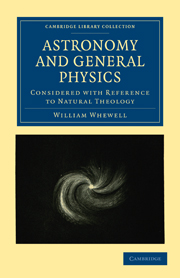Book contents
- Frontmatter
- NOTICE
- Contents
- INTRODUCTION
- BOOK I TERRESTRIAL ADAPTATIONS
- BOOK II COSMICAL ARRANGEMENTS
- CHAP. I The Structure of the Solar System
- CHAP. II The Circular Orbits of the Planets round the Sun
- CHAP. III The Stability of the Solar System
- CHAP. IV The Sun in the Centre
- CHAP. V The Satellites
- CHAP. VI The Stability of the Ocean
- CHAP. VII The Nebular Hypothesis
- CHAP. VIII The Existence of a Resisting Medium in the Solar System
- CHAP. IX Mechanical Laws
- CHAP. X The Law of Gravitation
- CHAP. XI The Laws of Motion
- CHAP. XII Friction
- BOOK III RELIGIOUS VIEWS
CHAP. XII - Friction
from BOOK II - COSMICAL ARRANGEMENTS
Published online by Cambridge University Press: 05 August 2011
- Frontmatter
- NOTICE
- Contents
- INTRODUCTION
- BOOK I TERRESTRIAL ADAPTATIONS
- BOOK II COSMICAL ARRANGEMENTS
- CHAP. I The Structure of the Solar System
- CHAP. II The Circular Orbits of the Planets round the Sun
- CHAP. III The Stability of the Solar System
- CHAP. IV The Sun in the Centre
- CHAP. V The Satellites
- CHAP. VI The Stability of the Ocean
- CHAP. VII The Nebular Hypothesis
- CHAP. VIII The Existence of a Resisting Medium in the Solar System
- CHAP. IX Mechanical Laws
- CHAP. X The Law of Gravitation
- CHAP. XI The Laws of Motion
- CHAP. XII Friction
- BOOK III RELIGIOUS VIEWS
Summary
We shall not pursue this argument of the last chapter, by considering the other laws of motion in the same manner as we have there considered the first, which might be done. But the facts which form exceptions and apparent contradictions to the first law of which we have been treating, and which are very numerous, offer, we conceive, an additional exemplification of the same argument; and this we shall endeavour to illustrate.
The rule that a body naturally moves for ever with an undiminished speed, is so far from being obviously true, that it appears on a first examination to be manifestly false. The hoop of the school boy, left to itself, runs on a short distance, and then stops; his top spins a little while, but finally flags and falls; all motion on the earth appears to decay by its own nature; all matter which we move appears to have a perpetual tendency to divest itself of the velocity which we communicate to it. How is this reconcileable with the first law of motion on which we have been insisting?
It is reconciled principally by considering the effect of Friction. Among terrestrial objects friction exerts an agency almost as universal and constant as the laws of motion themselves; an agency which completely changes and disguises the results of those laws. We shall consider some of these effects.
- Type
- Chapter
- Information
- Publisher: Cambridge University PressPrint publication year: 2009First published in: 1833



